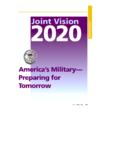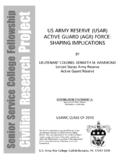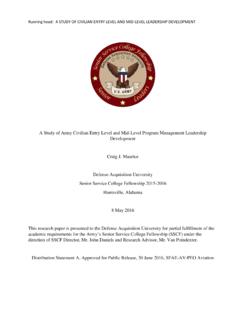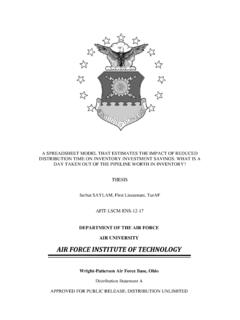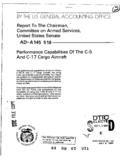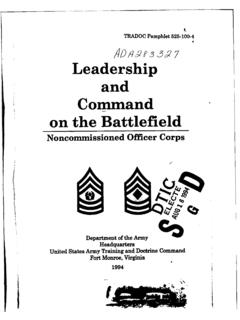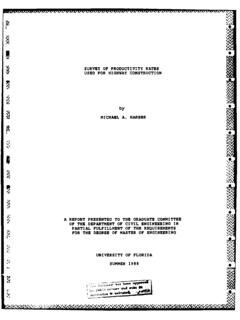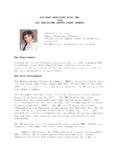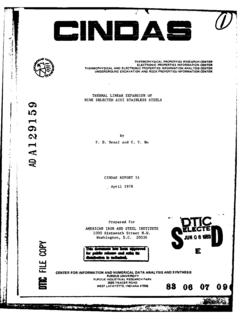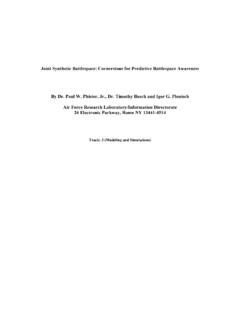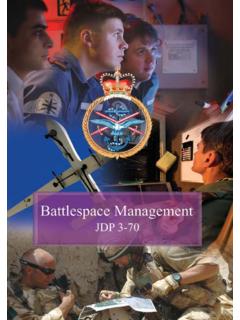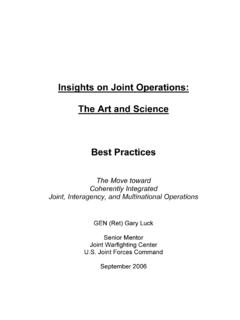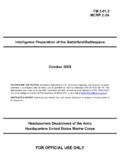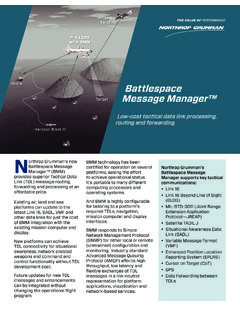Transcription of Ethical Failure and its Operational Cost
1 I Ethical Failure and its Operational cost A Monograph by Major Jeffrey A. La Plante School of Advanced Military Studies United States Army Command and General Staff College Fort Leavenworth, Kansas AY 2011-02 REPORT DOCUMENTATION PAGE Form Approved OMB No. 0704-0188 Public reporting burden for this collection of information is estimated to average 1 hour per response, including the time for reviewing instructions, searching existing data sources, gathering and maintaining the data needed, and completing and reviewing this collection of information. Send comments regarding this burden estimate or any other aspect of this collection of information, including suggestions for reducing this burden to Department of Defense, Washington Headquarters Services, Directorate for Information Operations and Reports (0704-0188), 1215 Jefferson Davis Highway, Suite 1204, Arlington, VA 22202-4302. Respondents should be aware that notwithstanding any other provision of law, no person shall be subject to any penalty for failing to comply with a collection of information if it does not display a currently valid OMB control number.
2 PLEASE DO NOT RETURN YOUR FORM TO THE ABOVE ADDRESS. 1. REPORT DATE (DD-MM-YYYY) 01-12-2011 2. REPORT TYPE Monograph 3. DATES COVERED (From - To) JAN 2011 DEC 2011 4. TITLE AND SUBTITLE Ethical Failure and its Operational cost 5a. CONTRACT NUMBER 5b. GRANT NUMBER 5c. PROGRAM ELEMENT NUMBER 6. AUTHOR(S) MAJ Jeffrey A. La Plante 5d. PROJECT NUMBER 5e. TASK NUMBER 5f. WORK UNIT NUMBER 7. PERFORMING ORGANIZATION NAME(S) AND ADDRESS(ES) School of Advanced Military Studies 250 Gibbon Avenue Fort Leavenworth, KS 66027-2134 8. PERFORMING ORG REPORT NUMBER 9. SPONSORING / MONITORING AGENCY NAME(S) AND ADDRESS(ES) Command and General Staff College 731 McClellan Avenue Fort Leavenworth, KS 66027-1350 10. SPONSOR/MONITOR S ACRONYM(S) CGSC 11. SPONSOR/MONITOR S REPORT NUMBER(S) 12. DISTRIBUTION / AVAILABILITY STATEMENT Approved for Public Release; Distribution is Unlimited 13. SUPPLEMENTARY NOTES 14. ABSTRACT Ethical failures during the current era of persistent conflict have had significant Operational costs.
3 To minimize the effects of these Operational costs, leaders must morally asses their forces and strive to implement programs to minimize future Ethical failures while developing systems which promote learning from failures which occur. Fundamental development and implementation of ethics is crucial to minimize the risk of future Ethical failures. While the artifacts of the Army Ethic fall under the purview of Strategic leaders, development of ethics within Operational units and the follow-on implementation of those ethics is the purview of the Operational commander. When Ethical failures do occur, Operational units must have the necessary systems in place to address those failures and promote learning throughout the unit. Failure to implement the necessary systems increases the risk of Operational costs of future Ethical failures. 15. SUBJECT TERMS Ethical Failure , Ethics, Leadership 16. SECURITY CLASSIFICATION OF: 17. LIMITATION OF ABSTRACT 18.
4 NUMBER OF PAGES 19a. NAME OF RESPONSIBLE PERSON THOMAS C. GRAVES COL, U. S. ARMY a. REPORT b. ABSTRACT c. THIS PAGE 19b. PHONE NUMBER (include area code) (U) (U) (U) (U) 62 pp. 913-758-3302 Standard Form 298 (Rev. 8-98) Prescribed by ANSI Std. ii SCHOOL OF ADVANCED MILITARY STUDIES MONOGRAPH APPROVAL Major Jeffrey A. La Plante Title of Monograph: Ethical Failure and its Operational cost . Approved by: _____ Monograph Director Dan C. Fullerton, _____ Second Reader Robert D. Haycock, COL, IN _____ Director, Thomas C. Graves, COL, IN School of Advanced Military Studies _____ Director, Robert F. Baumann, Graduate Degree Programs Disclaimer: Opinions, conclusions, and recommendations expressed or implied within are solely those of the author, and do not represent the views of the US Army School of Advanced Military Studies, the US Army Command and General Staff College, the United States Army, the Department of Defense, or any other US government agency.
5 Cleared for public release: distribution unlimited. iii Abstract Ethical Failure and its Operational cost by Major Jeffrey A. La Plante. Ethical failures during the current era of persistent conflict have had significant Operational costs. To minimize the effects of these Operational costs, leaders must morally asses their forces and strive to implement programs to minimize future Ethical failures while developing systems which promote learning from failures which occur. Fundamental development and implementation of ethics is crucial to minimize the risk of future Ethical failures. While the artifacts of the Army Ethic fall under the purview of Strategic leaders, development of ethics within Operational units and the follow-on implementation of those ethics is the purview of the Operational commander. When Ethical failures do occur, Operational units must have the necessary systems in place to address those failures and promote learning throughout the unit.
6 Failure to implement the necessary systems increases the risk of Operational costs of future Ethical failures. iv Table of Contents Chapter 1: Introduction .. 1 Conflict, Leadership, and Professional Concerns .. 1 Leadership in an Era of Persistent Conflict .. 6 What Constitutes an Operational cost .. 7 Definitions .. 8 Caveats .. 10 Monograph Outline .. 10 Chapter 2: Ethical Failures and Their Causes .. 10 Ethics and the Military .. 11 Pacifism, Realism, and everything in between .. 12 Just War .. 13 Ethical Decisions and Failures .. 15 Chapter 3: The Army Profession and Ethic .. 21 The United States Army Ethic .. 21 Culture .. 24 25 Maturity .. 26 Strength .. 28 Courage .. 29 Moral Beliefs and Moral Experience .. 29 The Army s Ethical Processing Model .. 30 Recognize the Conflict .. 31 Evaluate the Options .. 32 Commit to a Decision and Act .. 33 Chapter 4: Ethical Analysis of Iraq .. 33 Reported Unit Ethical Failures .. 34 The Army s Mental Health Advisory Teams (MHAT).
7 34 Mental Health Advisory Team (MHAT) V Operation Iraqi Freedom 06-08 .. 35 The EXCEL Study .. 36 Validity and Applicability of the Study .. 36 Ethical Implications .. 37 Ethical Causes .. 38 Chapter 5: Operational Implications .. 41 The Development of Ethics within Operational Units .. 41 Operational Actions in Ethical Failure .. 42 Future Costs of Ethical Failure .. 43 Conclusion .. 44 Appendix 1: The Kohlberg Scale of Moral Development .. 45 Appendix 2: EXCEL Study Numerical Findings .. 46 Appendix 3: Soldier Combat and Well Being Models .. 50 Appendix 4: Elements of the Ethical Battlespace .. 51 Appendix 5: Events in Ethical Failure .. 53 BIBLIOGRAPHY .. 54 1 Chapter 1: Introduction In the face of so many challenges, we have demonstrated great strengths such as the determination and adaptability of our junior leaders and their dedication to service shown through numerous deployments. Yet we have also struggled in some areas to maintain the highest standards of the Profession of Arms.
8 As we have at other times in our history, we assess that it is time to refresh and renew our understanding of our profession. 1 - Profession of Arms White Paper Ethics are a keystone to Operational Art and essential in Mission Command. Leaders who tolerate Ethical failures at lower levels in order to attain better results reduce the accepted military Ethical standard and cause degradation in concurrent and future operations. Leaders create a morally ambiguous atmosphere when that leader focuses solely on the results of an operation without concern on how the operation is accomplished which can risk the legitimacy of the operation. The premier military theorist, Carl von Clausewitz s trinity emphasizes the importance of civil support to military forces in the development of war. Moral ambiguity erodes the validity of the operation in the view of the citizen and therefore risks the reduction of national support for the given operation and other operations to which that unit is associated.
9 Ethical failures during this era of persistent conflict have had significant Operational costs. To minimize the effects of these Operational costs, leaders must morally assess their forces and strive to implement programs to minimize future Ethical failures while developing systems which promote learning from failures which occur. Conflict, Leadership, and Professional Concerns On 12 January 2011, General (Retired) Fred Franks delivered the keynote address for the initiation of the yearlong Unified Quest campaign from Army Executive Order 139-11. Unified Quest is a developmental process to review, assess, evolve, and change the Profession of Arms 1 Profession of Arms Campaign, Profession of Arms Campaign Glossary, Center for the Army Profession and Ethic. (accessed 28 April 2011), p. 1. 2 and specifically to conduct a review of the Army profession in an era of persistent conflict.
10 2 During the past ten years, soldiers have traveled back and forth across the oceans, replacing the security of their homes and families with countless morally ambiguous situations found within the current conflict. Most soldiers can relate at least one combat zone story that tested their professionalism and forced them to question the foundation of their values and morals. These personal struggles have often mixed with professional conflicts to create internal tensions. These internal tensions often drive soldiers to question the values and ideals they hold as the basis of their service, contributing to cases of Post-Traumatic Stress Disorder (PTSD) and suicide. Moral issues have existed as a part of warfare since its inception. As tribes developed into nations, leaders have been faced with the problem of guiding their forces to ensure their actions follow the spirit of the nation they represent. President Abraham Lincoln first identified the need for values and ideals to guide professional military service during the Civil War.
